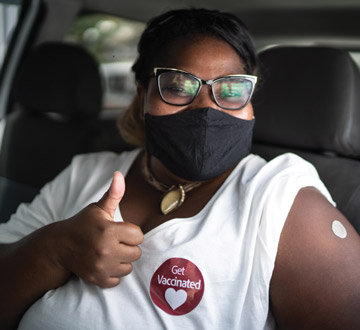Immunity in AR Community
COVID-19 threatens our health and disrupts our lives. Now, a vaccine that offers protection against the virus gives us a shot for a healthier tomorrow - but many of us still have questions.
If you’re deciding if the vaccine is right for you, talk to friends, healthcare providers
and people
you trust. The decision is personal so educate yourself. Don’t miss your shot to learn
the facts.
Learn About Why Vaccination is Important

Prevention is protection! Ending a pandemic is a group effort and requires using all tools available. The COVID-19 vaccine is a safe, effective way to protect our communities. When people do not get the virus, they cannot spread the virus—which is why vaccination is so important to help end the COVID-19 pandemic.
Can I get the virus from the vaccine?
You cannot get COVID-19 from the vaccine. The COVID-19 vaccines do not use any form of the virus. The vaccines teaches our immune system how to recognize and fight the virus that causes COVID-19 without having to give people the actual illness.
How is population immunity is achieved?
When enough people are immune to a disease, it cannot be spread. Population immunity protects entire communities and is especially needed to protect those unable to get the vaccination themselves, like young children and people with medical conditions.
Understand Facts About COVID-19 Vaccine
- There are no live viruses in the COVID-19 vaccine; recipients are not at risk of catching
the disease.
- COVID-19 vaccines do not change or interact with your DNA in any way.
- You cannot get sick with COVID-19 from the authorized vaccinations.
- Getting vaccinated not only protects you, but those around you.
- If you’re deciding if the vaccine is right for you, talk to friends, healthcare providers and people you trust.
After vaccination, how long does it take to be immune?
If it has been less than two weeks since your shot, or if you still need to get your
second shot, you are NOT fully
protected. Keep taking all prevention steps until you are fully vaccinated (two weeks
after your final shot.)
How was the COVID-19 developed so quickly?
Technologies behind the vaccine were built on decades of research and experience. Before the novel coronavirus, which causes COVID-19, scientists had researched similar coronaviruses called SARS and MERS. This past research provided a head start to develop the COVID-19 vaccination.
Was the COVID-19 vaccine tested enough?
Testing for the vaccine was extensive—no safety steps were skipped. Before trials, there is usually a lot of administrative work—submissions, answering questions from regulatory agencies, etc.—that can take up to a year before actual testing can begin. Because COVID-19 is a public health emergency, scientists were allowed to skip this more clerical step and strictly do the research needed. There were no risky shortcuts. Another advantage that helped expedite the process was the collaboration of scientists throughout the world working around the clock. This teamwork meant the data, research and trials were shared which helped reach a vaccination sooner.
Does the vaccine change your DNA?
No. The vaccine teaches your cells how to recognize and fight COVID-19. It doesn’t impact the part of the cell where the DNA is.
Can the vaccine track me?
No. There is no tracking technology in the vaccine.
Learn more vaccine facts on our FAQ page
Decide to Protect Yourself and Your Community
We are all in this together! Ending a pandemic is truly a group effort. The COVID-19 vaccine is a safe and effective way to protect our vulnerable communities that are unable to get vaccinated.
Long-term protection beats possible short-term side effects.
After the shot, some people develop side effects. This is normal and means the body is building immunity against COVID-19. Symptoms could last a day or two and may include chills, fatigue, headache, fever, muscle or joint pain, diarrhea, vomiting or redness or swelling at the injection site.
Cough, shortness of breath, new loss of taste or smell, sore throat, congestion or runny nose are not expected symptoms of the vaccine. Testing for COVID-19 is recommended even if these symptoms arise within 48 hours of the vaccine.
The best way to protect yourself and others is to get vaccinated.

Get vaccinated! The vaccination is our shot to help stop the spread of COVID-19 and return to life as it was. When more people are vaccinated, more people stay healthy, businesses reopen and communities can reconnect.
Getting vaccinated is an opportunity to protect yourself—and others. COVID-19 can take lives—the COVID-19 vaccine will save lives.
Let's end this pandemic!
Visit the Arkansas Dept. of Health website to find vaccine locations across the state.
